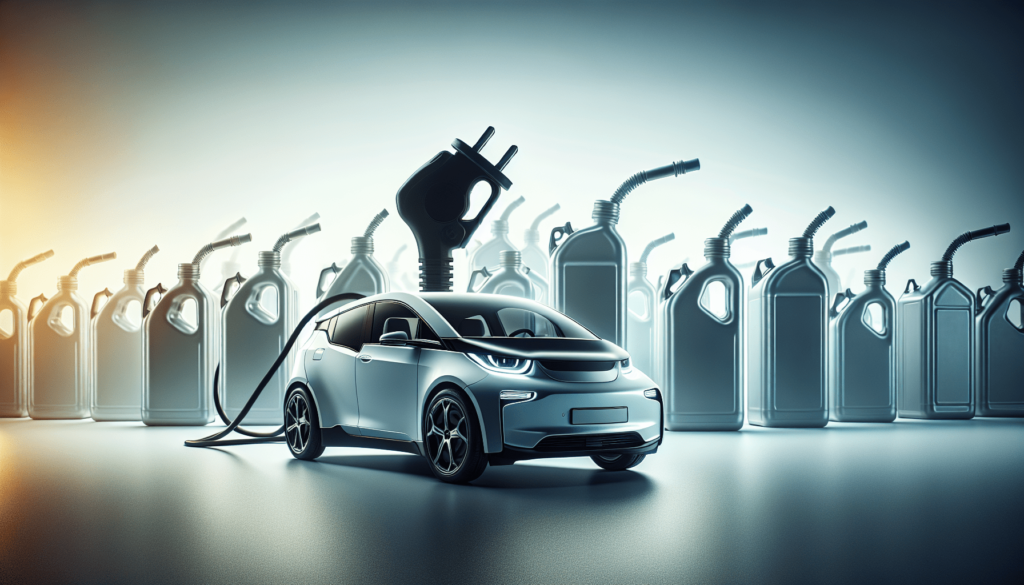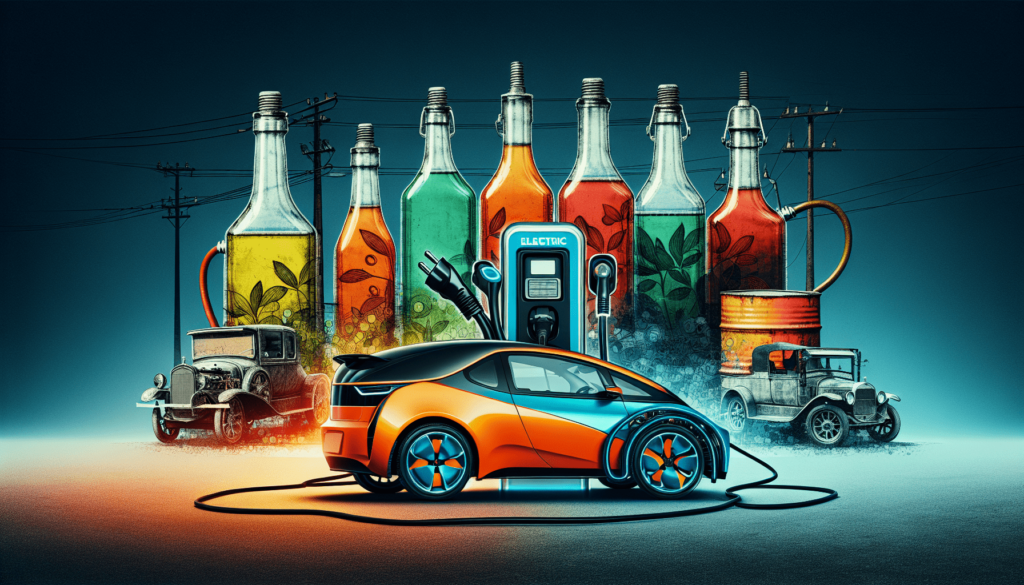Alright, let’s talk about electric cars and the whole oil situation. You might be wondering if electric vehicles, with all their talk of being eco-friendly and futuristic, need oil to keep them running. It’s an interesting question when you think about it, considering how traditional cars are pretty much in a committed relationship with oil changes. So, do electric cars use oil? Let’s clear the air on this topic and get you all the facts you need.
Understanding Electric Cars
Definition and how they work
Electric cars are vehicles that are propelled by one or more electric motors, using energy typically stored in rechargeable batteries. What sets them apart is their absence of an internal combustion engine, relying instead on electric power. As you turn the ignition key or press the start button, electricity flows from the battery to the motor, converting that electrical energy into mechanical energy. This process is much cleaner and more efficient than burning fuel in an internal combustion engine.
Key components of electric vehicles
At their core, electric vehicles (EVs) hinge on a few key components. The battery acts as the heart, storing energy necessary to drive the motor. The electric motor then transforms electrical energy into motion, propelling the vehicle. Not to be overlooked, the inverter plays a pivotal role by converting direct current (DC) from the battery into alternating current (AC), a form the motor can utilize. Together, these elements form the backbone of an EV’s operation.
Comparison with internal combustion engine vehicles
When you compare electric cars to conventional internal combustion engine (ICE) vehicles, several differences stand out. Firstly, EVs are significantly quieter and emit no tailpipe pollutants, providing a cleaner alternative. They also generally have fewer moving parts, which can lead to lower maintenance costs. However, they currently face challenges such as higher initial purchase prices and concerns around driving range and charging infrastructure.
Do Electric Cars Use Oil?
Exploring the misconception
A common question is, “Do electric cars use oil?” It’s understandable, considering our long history with gasoline-powered cars. The short answer is that while EVs don’t use oil in the same way—meaning there’s no oil change like in ICE vehicles—they still use lubricants and coolants for other essential components.
Types of oil used in cars
In traditional cars, motor oil is crucial for lubricating the engine’s moving parts. However, in electric cars, the types of oils used are different. You might find specialized coolants and lubricants designed for electric motors and battery systems, but not the traditional motor oil used in combustion engines.
Oil use in electric vehicle maintenance
Even though EVs don’t require oil changes, they do need other forms of maintenance. This includes the replacement of brake fluid, transmission fluid, and sometimes, specific lubricants for moving parts within the electric motor and the wheels. So, while the maintenance schedule for an EV might look different, it’s not completely devoid of fluids.

Lubrication Needs in Electric Cars
Components requiring lubrication
In EVs, several components still require lubrication. This includes the wheel bearings, gearboxes (if the model has one), and other mechanical parts like the steering system. These components are crucial for the smooth operation of the vehicle and need regular attention to avoid wear and tear.
Types of lubricants used in electric cars
The lubricants used in electric cars are specialized. They are designed to withstand high temperatures and electrical currents, which traditional motor oils aren’t formulated to handle. These lubricants ensure the efficient operation of components and help in dissipating heat.
Frequency of lubrication
The frequency of lubrication in electric cars can vary based on the model and manufacturer recommendations. Generally, it’s less frequent than oil changes in ICE vehicles, thanks to fewer moving parts and the usage of advanced lubricants. Always refer to your vehicle’s maintenance guide for the best practices.
Cooling Systems in Electric Cars
Overview of the electric vehicle cooling system
Cooling systems in electric cars serve a critical function by managing the temperature of the battery and electric motor. Unlike ICE vehicles that generate more heat due to combustion, EVs need cooling for their electrical components to operate efficiently and safely.
Role of coolants in electric vehicles
Coolants in EVs are used to absorb and dissipate heat from the battery and motors. These specialized fluids help maintain optimal operating temperatures, ensuring that the vehicle runs smoothly and the battery retains its longevity.
Differences in cooling system maintenance between electric and internal combustion engines
Maintaining an EV’s cooling system is different from an ICE vehicle’s. With no engine oil to replace or exhaust system to care for, the focus shifts to regularly checking the coolant levels and ensuring that the system is clean and functioning properly. This can lead to different maintenance schedules and requirements.

Transmission Fluid in Electric Cars
Function of transmission fluid
Transmission fluid in electric cars has a dual role. It lubricates moving parts within the gearbox and acts as a coolant, helping to manage the temperature. This ensures that the transmission operates smoothly and efficiently.
Transmission fluid change in electric cars
Just like in conventional cars, the transmission fluid in EVs needs to be replaced, but the frequency might differ. EVs generally require less frequent changes due to the reduced number of moving parts and the different operating conditions. Again, check your vehicle’s documentation for specific guidance.
Comparing electric and conventional car transmission systems
The transmission systems in EVs are often simpler than those in ICE vehicles, mainly because electric motors offer a broader range of operation without the need for multiple gears. However, sophisticated EVs still use complex transmissions that need regular maintenance, including fluid changes.
Brake Fluid and Other Consumables
Role of brake fluid in electric cars
Brake fluid is essential in electric cars, just as it is in traditional vehicles. It operates under high pressure to transfer the force applied by your foot on the pedal to the brake pads. Without it, your car wouldn’t be able to stop efficiently.
Checking and replacing brake fluid
It’s crucial to regularly check and replace the brake fluid in your electric vehicle to ensure safety and optimal performance. Over time, brake fluid can absorb moisture, leading to a decrease in its effectiveness and potentially causing damage to the brake system.
Other consumables in electric vehicle maintenance
Aside from brake fluid, electric cars require the maintenance of other consumables such as windshield washer fluid, air conditioning refrigerant, and cabin air filters. These items need regular attention to ensure your EV continues to operate as intended.

Battery Maintenance
Understanding electric car batteries
Electric car batteries are the powerhouse of the vehicle, storing the electric energy needed to drive the motor. These batteries are complex assemblies of lithium-ion cells that provide a balance between energy density, longevity, and safety.
Battery maintenance practices
To maintain the health of an electric car’s battery, it’s important to follow best practices such as avoiding extreme temperatures, maintaining a balanced state of charge, and avoiding fast charging as your primary method. These habits can help extend the battery’s life.
The lifespan of electric car batteries
The lifespan of electric car batteries can vary, but most manufacturers offer warranties for up to 8 years or a certain mileage. With proper care, batteries can last well beyond their warranty period, although they may experience reduced capacity over time.
Environmental Impact
Electric cars’ environmental benefits
Electric cars offer significant environmental benefits over ICE vehicles, primarily from reduced emissions. By using electricity instead of gasoline or diesel, EVs help decrease air pollution and contribute to a cleaner environment.
Lifecycle analysis of electric cars versus gasoline cars
Lifecycle analyses of electric cars show that, even when considering the manufacturing and disposal of batteries, EVs typically have a lower overall environmental impact compared to gasoline cars. The largest benefits are seen in regions where electricity is generated from renewable sources.
The impact of manufacturing and recycling batteries
The manufacturing of electric car batteries does have an environmental footprint, primarily due to the extraction of lithium and other materials. However, efforts are underway to improve battery recycling processes, which will further reduce the environmental impact of EVs.

Cost of Maintenance
Comparing maintenance costs: electric cars vs. gasoline cars
Overall, electric cars tend to have lower maintenance costs compared to gasoline cars. This is due to fewer moving parts, the absence of oil changes, and generally simpler systems.
Breakdown of electric car maintenance costs
The primary maintenance costs for electric cars include battery health checks, replacement of the various fluids we’ve discussed, and care for the brake system. These costs are generally lower and less frequent than those associated with ICE vehicles.
How electric vehicles save money in the long term
In the long term, electric vehicles can save you money through reduced maintenance costs and lower fuel expenses. The initial higher purchase price of EVs can often be offset by these savings, making them a financially smart choice over time.
Conclusion
Summary of oil use in electric cars
To sum up, electric cars do not use oil in the traditional sense required by combustion engines, but they do utilize various fluids for lubrication, cooling, and braking. Understanding the maintenance needs of an EV can help ensure its longevity and performance.
Final thoughts on the evolution of vehicle maintenance
The evolution of vehicle maintenance from ICE vehicles to electric ones reflects broader technological advancements and a shift towards more sustainable modes of transportation. As electric vehicles continue to grow in popularity, understanding their maintenance needs will become increasingly important.
Encouragement for further reading and learning
If you’re considering an electric vehicle or already own one, diving deeper into the specifics of electric vehicle maintenance can help you better care for your car. There’s always more to learn, and staying informed can help make your EV experience as smooth and rewarding as possible.

